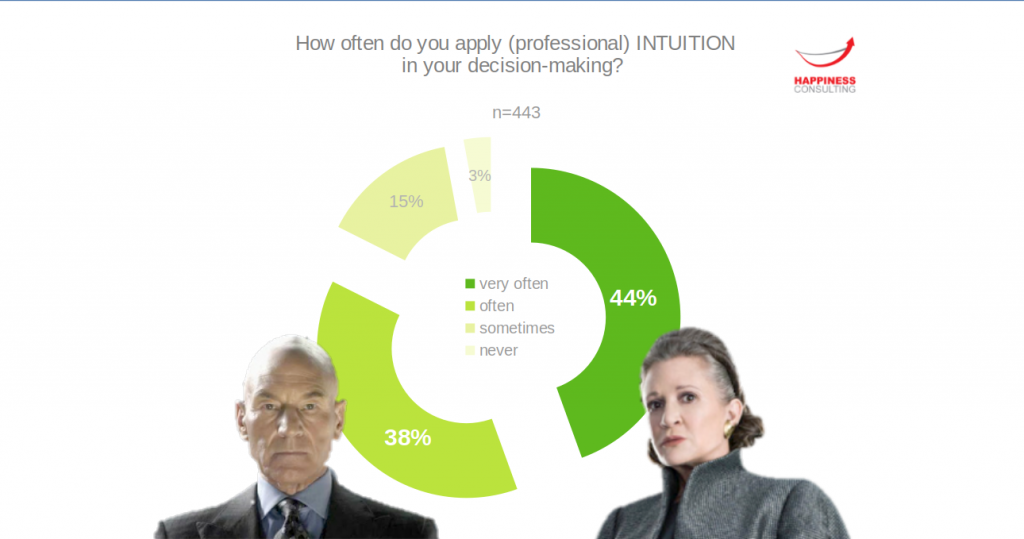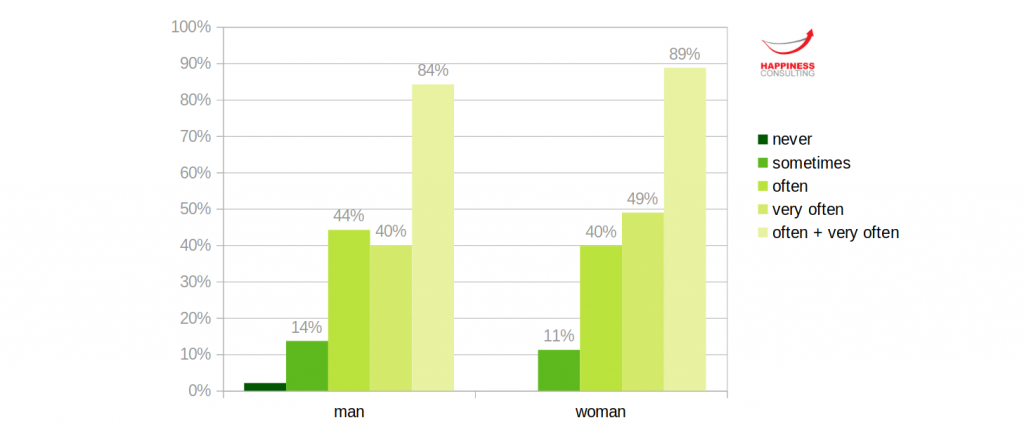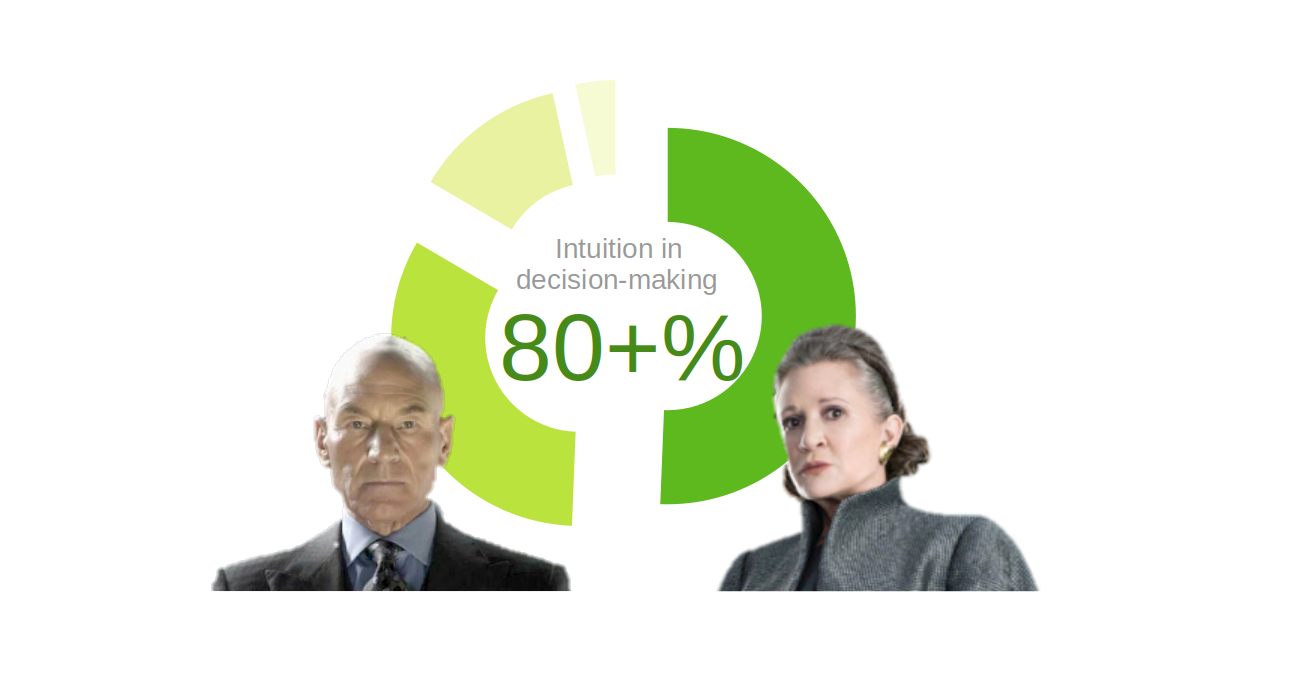More than 80 percent of human decision-makers often use their professional intuition.
Is intuition a mystical cloud incomprehensible to common sense, or is intuition a defining element of our reality? The current state of a recent research says, more than 80 percent of human decision-makers often or very often use their intuition in their daily decisions.
In the ordinary sense, intuition can be apostrophized as a kind of inner voice, insight, foresight, sixth sense, listening to our hearts, or even a gut decision. We have all heard of this ability that has long been called mystical, cloud-derived, the existence of which has been questioned by many over time. However, today’s scientific research has sided with the reality, appropriateness, and developability of intuition with their recent evidence.
The basis of our consciously intuitive decision-making is our integrative thinking
Our integrative approach has developed in everyday decisions, the fundamental element of recognizing the essence of complex, multi-disciplinary structures. By comparing the differentiating features/criteria and combining their advantages, we try to get a strategically cohesive solution. Systems thinking has become a new, independent, supportive discipline. The point is to grab and bundle of diversified threads at one point. “What is the most crucial factor or ability? What has an impact on the most people?” – we may ask ourselves.
Managers’ response usually identifies two primary factors and a third that brings these two together. One is to sense what is happening, which we today call awareness intelligence (AQ). The other we call a happy mindset, the ability to improve what we recognized with wittily positive methods. The third is to combine these two together under one roof by formulating them as responsible happiness.
In a corporate culture, one may regularly measure and develop them.
Because we have recognized with the help of ‘systems thinking’ that reality is so diverse, complex, and transcends the boundaries of logical analysis. We develop and study intuition as one of the key factors influencing our awareness intelligence (AQ) development. Is a manager able to know that something is right or wrong by arriving at the company’s headquarters, walking through the cloud of people, just by “sniffing into the air”?
In the competition of market and talent attraction, every drop of (managerial) knowledge counts. Any small, albeit unique, competitive advantage can bring serious business growth that may manifest in serious ‘M’s or ‘B’s. We may just think about an idea for an invention or a covid period decision with a non-clearly visible outcome. As the potential of professional intuition promises excellent efficiency increase, it’s no wonder that more and more leaders turn towards it. Who doesn’t want to lead easier and live freer? This, of course, requires that we know what we are doing.
Intuition permeates all significant fields of science
Nowadays, we may come across a growing number of studies that point to intuition’s functioning and advantages from several scientific fields. Thus, from economics, quantum physics, biology, sociology, philosophy, psychology, healthy sustainability (well-being), many materials are revealed to us, either individually or in organized in a bunch. Analyzing these studies in an integrative way, we can conclude that the listed areas have the same essence at one point; they can be combined in their base with adequate knowledge, transparency, and abstraction. In what form is this possible? Any thought appears in our consciousness’s intuitive space, plays in it, and finally dissolves in it. After they arise, we can set up any intelligence structure and set of concepts from them. The point is this: if we get to know/recognize in ourselves the moment/process as thoughts and emotions appear and unfold, we grasp the foundation of the world we experience. If we become a master of this, we become a master of everything.
How is it possible? How to get started? By understanding that we not only have a brain capable of logical analysis, but we also have a consciousness/mind/awareness (whatever we call it) that is independent of the limited abilities of our brain. Our mind — our true essence — is beyond thoughts, ideas, concepts, and words, found between or behind them. We understand each other beyond words, we say often. I know what you meant before you said it. Our consciousness’s sun-like radiance flashes before us from behind the clouds of emotions and thoughts at such and similar moments.
Because this mind is space-like in its nature according to quantum physics, our “Ahaaa” -like insights beyond space and time may bubble up from the spatial depths of the ocean of our consciousness. These intuitive impulses are not always recognized because of the illusion-like cloud of the flow of feelings and thoughts – we call our world-experience -. In some cases, however, we can recognize and express them.
To do this on a more secure basis, we need to see through the clouds of everyday analytical thinking, conceptualized speech, and habits. We need to see through them, with a little luck and awareness intelligence, we need to be able to look behind them, and if necessary, we need to be able to mentally jump through or cut through them. We shall not listen to our inner, always-talking brain radio, but we shall notice, directly experience and express the transmitter tower’s signals, the intuition of our mind.
We feel the presence of our close relatives or close co-workers, friends. It is when we think of looking at our phones when they call us. When selecting a staff member, we already feel that hiring a candidate is the right decision or not. We are more positively sensitive to the “chemistry” of human connections. We simply know whether someone tells us the truth or not. We instinctively choose the better solution even in a decision-making situation with an uncertain outcome. From a small sign, we can predict what will happen, and our intuition helps us in many other ways, too.
More than 80 percent of decision-makers listen to their intuition often or very often
No wonder, that according to a recently running survey, more than 83% of decision-makers (managers, HR managers, recruiters, coaches/trainers/OD service providers) use their intuition often or very often. Specifically, 3% never, 15% sometimes, 34% often, and 48% (!) very often use their intuition according to representative online research (currently n=426) conducted in professional groups of social networks (Facebook, Linkedin). The dear reader may also generously help with the study by answering the simple question, “How often do you use your (professional) INTUITION in decision-making?”. Please be so kind as to answer it with one click.


Luckily, intuition can be improved
We know that the development of intuition is explicitly justified in the fulfillment of integrative thinking. We understand that all disciplines support their raison d’être with evidence. We know that 83 percent of us explicitly seek to apply their intuition. What is left is only the development of intuition.
The good news at this point is that intuition can be developed, like learning to read. We all absorbed the ability to speak in some natural way, but we all learned reading at energy expense. The situation is similar in the case of intuition. We first get to know the letters (the results of researches in this field). Then, we do our supporting homework (practice the various supporting factors of intuition) like linking together words and sentences (combining our understanding with an integrative vision). Next, we start reading aloud (practice intuition and hold the view that in its essence, everything is space-like).
So what source to turn to that is free of “mystical ezo-purple mist,” incense, black magic, new-age confusion, and refrigerator-Scientology? Which method is credible in the business world, developed in the right sequence, normal, intelligent, scientifically based, and is supported by numbers – so that we may be able to argue to our leaders -?
Seal Josephson
linkedin.com/in/sealj
Happiness & Well-being Consulting Intl
Download the article in .docx >> Click Here To Download

